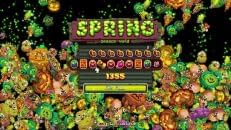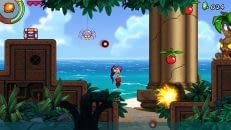IndieCade At E3: A Quick Look At All 20 Games On Show
Typically, E3 is a time for those big, gut-busting game developers to announce and dish details on the latest entry into whatever franchise they’re touting. Not for us though, our focus is still firmly on indie games as you should hope and so we’re pinpointing the titles being showcased at the IndieCade booth, all 20 of them. You’ll hopefully hear more great things about them and many others like them as the week goes by, but for now, we’re going to give you a quick overview of these games because why not?
As always, the games picked to be shown at the IndieCade booth at E3 are intended to showcase the breadth of indie games as well as how exciting they are. They are selected from the first round of submissions for the IndieCade 2012 Festival which will take place in October. These aren’t necessarily nominees for the festival, but there’s probably a strong possibility.
Controversial should be the middle name of Christine Love. Her latest visual novel delight, Analogue: A Hate Story, has drawn a fair amount of it due to its portrayal of transhumanism, traditional marriage, loneliness and cosplay. Let that not fool you though, those with some sense and an open mind will highly appreciate the game’s intricate and ultimately gloomy plot, though it being outlined as is about to happen will only leave confusion. The game is set in the far future and involves the player in direct communication with two AI characters -Hyun-ae and Mute – with whom they are supposed to access the logs of a generation ship that fell out of contact with Earth after it left to form a space colony.
If this game should need any introduction then consider us highly surprised. Edmund McMillen and Florian Himsl’s arcade-shooter come roguelike has proven very popular for its high replayability. Seriously – it dishes it out by the dump truck sized load it so capably can. Another game noted for its controversy, which ended up making Nintendo shy away from it, The Binding Of Isaac follows Isaac as he battles his way through the basements of his house after narrowly escaping the death claws of his crazed mother. You shoot enemies with tears, but that will soon change if the random generations grants you some decent power ups along your way through the filth and muck.
Coalesce
Now it’s time to relax, chill out for a second. Better. Living up to its name quite amicably, Coalesce is a game for the iPad in which players draw curves and lines across the screen in order to connect atoms of a similar color together. The intention is to provide a meditative experience, so alongside this simple gameplay you should expect soft vibes for your ears. For those with mild OCD, you will love this game. In connecting the atoms together you’ll form molecules, and thus bringing order back to the state of things (we’re all about science).
Originally born as a means to show off Flocking Animation and Modelling Environment (FAME), Dark Dot has evolved as a gameplay experience by getting…well, cuter. You control a flock of Darklets with your touchscreen; mainly avoiding dangers and shooting anything that gets in the way. As things escalate, you’ll need to find new ways to defend your flock. Luckily this will be manageable with a bunch of powers which will have to charged to use. Dark Dot is essentially a standard action shooter with some cool new tech behind it.
Dawn Of Cimmeria
Again with the drawing! This time in a game that fits neatly into the tower defence genre. But don’t scuttle off – there’s some pretty neat stuff going on here. Dawn Of Cimmeria actually has the player drawing “a web of living trees” in order to defend their base. How do trees help with any defending apart from getting in the way? Well, they can smash, shoot, and crush enemies that’s how. On top of this fairly interesting mechanic, the game is realized in what can only be described as a painting. The art style is bold and has a fluid feel to it, really emphasizing the various roots and branches of the trees in particular.
You may have already played this one. The Fourth Wall was released for free a couple of months ago and to quite a good reception. The reason being that, although it’s a puzzle platformer, there’s some pretty interesting gameplay going on here. Indeed, the game is quite the challenge and the level design, due to its main mechanic, is actually rather good. The premise of The Fourth Wall is that you are a wizard who can manipulate the boundaries of this world. In other words, the game exploits screen wrapping to it fullest potential. If you’re sitting there with a question mark over your head – screen wrapping is when an avatar goes through one side of the screen and emerges from the other.
Designed with the gallery space in mind, Hokra is a minimalist 2v2 sports game. There’s nothing complex in the game’s mechanics, visuals or audio and it is due to this that magic can happen. When rules are placed upon people in games, it restricts things and for a reason. Those who designed Hokra wanted to bring the player into this rule making process, hence the game’s minimalism. The basic idea of the game is to score goals as with most sport games. How you go about doing that can be experimented during play, with the idea of somebody “cheating” being entirely based on the meta-rules subconsciously applied by the group of players. It’s an effort to readjust the significance of local multiplayer.
Similar to Hokra, J.S. Joust is minimalist to the point of having no traditional screen with which to engage. This is a public performance game that uses the PlayStation Move controller and its build in accelerometer. As many players can play as there are controllers available and all they need is a bit of space and a Mac laptop. Once the initiations are over, players must keep their controllers steady, otherwise their light will go out and they too will be out of the game. The sensitivity of the controllers is determined by the tempo of the music too. The genius thing, once again due to the minimalism, is that players can negotiate the rules for themselves. Things are easier with the controller in your pocket for example – no one said you can’t do that.
This is something quite different, something that strokes our philosophical beards. And you know what? We like it. Languish claims to be a flight sim, but with words and ideas. Really, it’s just about flying around inside your mind (not literally but maybe). You’ll encounter a number of spheres which represent ideas, shooting out words to reflect themselves. Your job is to collect them to create sentences of meaning. If you collect an idea, you’ll need to make it stronger so that it can fight the other ones and come out the winner. Metaphors abound!
The Moonlighters
There’s two core elements to whoop and cheer about regarding The Moonlighters. Firstly is its blend of 1950s Hollywood glam and 1990s JRPG high fantasy. This results in a rather slick action isometric RPG experience. Secondly is the game’s adaptive narrative, and we’re talking above and beyond anything Bastion did here. This is a game that will actually watch what you’re doing via the gameplay and literally adapt what happens around what you decide to do. We’re assured that even though this may sound like something other games have done, the developers have taken it to a new level. On top of this rather promising idea, the game carries the excitement of a heist with it – several of them in fact. You’ll need to select a team, kit them out and make a plan in each heist you attempt.
A Mother’s Inferno
Psychedelia we meet again. And you’re also quite disturbing this time. You may have played A Mother’s Inferno previously, giving that it’s available to download for free. If not, know that it is rather peculiar and definitely worth giving a go. The idea is that you’re a mother going through one of the most hellish scenarios known to motherly kind – the loss of her son. Not by means of death though, he’s just missing on this train and you need to travel through the carts to find him. Expect some crazy stuff to happen on the way.
Not many games can get away with encouraging criminal activity (at least according to unscrupulous media), but Pickpocket Junction takes it one step further by physically simulating the act of stealing from a person’s pocket. Pitched as part memory, part math, part role-play; the idea of the game is to pick the pockets of other pick pocketers (we’re doing tongue twisters now?) in order to obtain the most valuable loot. The problem is that you don’t know what the pockets contain, unless you have a good memory or strike it lucky. It seems like a good excuse to hone those criminal skills that gamers are so efficient in apparently. That’s right isn’t it, mainstream media?
For many, mostly people with dreams and love in their life, prom week back in high school is a marvellous memory and not a time of disappointment and loneliness. In no way does that reflect our experience, ahem. Given that most likely fact, revisiting said week to organize your love life and other such trivial things should be very inviting. That’s what Prom Week is mostly about. It’s a social interacting sim really, enticing you to feel responsibility and pressures as you shape decisions around the big day.
Scale
What happens when the normally inflexible scale of objects in a world becomes malleable? What concepts emerge? Which concepts fall away? Those are the questions that drive Scale. It’s a first person game that allows the player to change the scale of the objects around them. Coming from the experimental and highly intelligent mind of Steve Swink, Scale has been in development for a couple of years now but nothing much is known about it. Great things are expected though, and that is enough for some. Plus that concept image is very eye catching and we like that.
Songlines
An increasing amount of games in this modern time are allowing players to be creative, whether they know it or not. Indie games, especially, are tapping into this new and exciting capability. One of which is Songlines which caters to player creativity twofold. It’s also one of the few games using the Kinect that actually seems worth a damn. The player flies over a landscape and using gestures they can shape it to their liking. Alongside this, the game’s music will be generated according to the player’s actions, thus the player creates music and a terrain at the same time.
We know how much you hate walls of text but Spelltower features them everywhere. This will never work! Oh wait, yes it will – because it’s a smart little thing and it knows it. There are several different modes to try out in Spelltower but the basic principal is the same. You are given a bunch of letters and with them you have to make words in order to build a score, beat the clock or avoid them piling up to the top of the screen. That’s all there is to it in all honesty – Scrabble with some nice music and none of that awkward family get together nonsense to accompany it. Okay it’s a bit more than that and it’s worth giving a go, it might surprise you.
Tickleplane
With a name like Tickleplane, you can’t go wrong. Wait a minute, we know this – it’s ASDFPLANE! Now renamed to ensure the giggle meter is used, Tickleplane is a great party game, providing you have enough keyboards. Each player has a keyboard and with it they have to “tickle” (or smash) the buttons on it, all of them, to drive their plane. The space bar is used to shoot your enemies and if you start going down in a blazing glory then you need to type ‘repair’ before the big crash. Very funny and should be played by more people.
Another game that shouldn’t really need an introduction. Arcen Games’ A Valley Without Wind has taken a couple of different forms during development but the one that has emerged from it all is a procedurally generated action adventure that borrows tropes from all over the place and merges them. There’s fully integrated co-op play to so that you and some mates can join forces and take on the forces of evil if you so please. Most distinct is the game’s water color-like art style which has proven divisive. Interesting nonetheless.
Who Took The Apple?
Was it you? Wasn’t us! Who Took The Apple? is a 4 player card game that – get this – is played “backwards in time”. This isn’t a literal time warping, but when compared to the likes of Space Alert and Robo Rally, this is most certainly playing the game backwards. Apparently using a bucket, four beers and a set of cards; players have to use strategic thinking and a focused team communication to compete for the apple.
ZOMBIEPOX
It’s a good job that the zombie disease doesn’t spread as easily as chicken pox, otherwise we’d practically all be zombies by now. ZOMBIEPOX is said to be a 1-4 player game in which the task is to cure or vaccinate the towsfolk that are under their protection from the zombie outbreak. While protecting them from the disease is the aim, it’s not made clear as to whether anything more is required on your part, because you know – zombies will eat and kill you anyway. Though, given that ZOMBIEPOX was originally conceived as game of disease control to stop the spread of misinformation concerning the effects of vaccination, that might not be likely.






